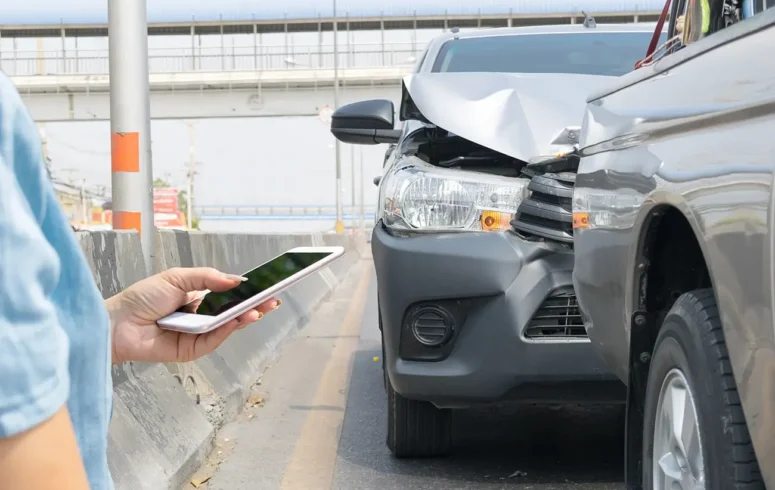Uninsured Motorist
Helping Clients Secure the Compensation They Deserve When Dealing With Uninsured Motorist Claims.
Contact Simon Law to schedule your free case evaluation.
Uninsured Motorist Claims Attorneys at Simon Law
Uninsured motorist (UM) claims arise when you are involved in an accident with a driver who does not have insurance coverage. Despite mandatory insurance laws, many drivers operate vehicles without the necessary insurance, leaving victimes vulnerable to significant financial losses. Uninsured motorist coverage is designed to protect you in such situations by providing compensation for injuries and damages caused by an uninsured driver.
Simon Law is dedicated to advocating for your rights and securing fair compensation in uninsured motorist cases. Our experienced legal team will thoroughly investigate your accident, gather crucial evidence, and negotiate with your insurance company to ensure you receive the maximum compensation available under your policy. We understand the complexities of uninsured motorist claims and are committed to guiding you through every step of the legal process.

About Uninsured Motorist Litigation
Uninsured motorist coverage is a type of insurance included in many auto insurance policies to protect drivers who are injured or suffer property damage due to an accident with an uninsured driver. This coverage can help pay for medical bills, lost wages, and other damages that would otherwise be out-of-pocket expenses for the victim.
What Should I Do if I Am Hit by an Uninsured Motorist?
If you are hit by an uninsured motorist, taking immediate and strategic steps is crucial to protect your rights and strengthen your uninsured motorist claim. Here is a detailed guide on what you should do:
- Call the police: Report the accident to the police immediately. Ensure that a police report is filed, as it will document the accident and the fact that the other driver is uninsured. This report is vital for your claim.
- Seek medical attention: Obtain medical help right away, even if you think your injuries are minor. Prompt medical attention is important for your health and provides necessary documentation for your claim. Follow all medical advice and keep records of your treatments.
- Gather information: Collect as much information as possible at the scene. This includes:
- Contact details of the uninsured driver
- Vehicle information (make, model, license plate number)
- Witness statements and their contact information
- Photos of the accident scene, vehicle damage, and any visible injuries
- Notify your insurance company: Contact your insurance company to report the accident and inform them that the other driver is uninsured. Provide them with all the relevant details and documentation. Be honest and thorough in your report.
- Consult an attorney: Contact an experienced attorney, such as those at Simon Law, to guide you through the process of filing an uninsured motorist claim. An attorney can help you understand your rights, gather necessary evidence, and negotiate with your insurer to secure fair compensation.
- Keep records: Maintain detailed records of all medical treatments, expenses, and any communication with your insurance company. This includes:
- Medical bills and records
- Repair estimates and bills for vehicle damage
- Receipts for any out-of-pocket expenses related to the accident
- Documentation of lost wages if you are unable to work
- Follow up on your claims: Stay in regular contact with your insurance company and your attorney. Keep track of the progress of your claim and provide any additional information or documentation promptly when requested.
How Do I File an Uninsured Motorist Claim?
Filing an uninsured motorist (UM) claim involves several important steps to ensure that you receive the compensation you deserve. Here’s a detailed guide to help you navigate the process:
- Report the accident to the police: Immediately call the police to report the accident. Make sure a police report is filed, as it will document the incident and the fact that the other driver is uninsured. This report is crucial evidence for your claim.
- Notify your insurance company: Contact your insurance company as soon as possible to report the accident. Inform them that the other driver is uninsured. Provide them with all relevant details, including the police report, photos of the accident scene, and any witness statements.
- Seek medical attention: Get medical help right away, even if your injuries seem minor. Prompt medical attention is important for your health and for documenting your injuries, which will be necessary for your claim. Keep all medical records and bills.
- Document the accident: Gather and organize all evidence related to the accident, including:
- Photos of the accident scene, vehicle damage, and any visible injuries
- Contact details and statements from witnesses
- Any correspondence with the uninsured driver, if applicable
- Review your insurance policy: Check your auto insurance policy to understand your uninsured motorist coverage. This will help you know what to expect in terms of coverage limits and the types of compensation you can seek.
- Consult an attorney: Contact an experienced attorney, such as those at Simon Law, to guide you through the process. An attorney can help you understand your rights, gather necessary evidence and negotiate with your insurer to secure fair compensation.
- File the claim: With the help of your attorney, formally file your uninsured motorist claim with your insurance company. Provide all necessary documentation, including:
- The police report
- Medical records and bills
- Photos and witness statements
- Repair estimates for vehicle damage
- Any other relevant evidence
- Negotiate with your insurance company: Your attorney will negotiate with your insurance company on your behalf to ensure you recieve a fair settlement. This may involve providing additional evidence, answering questions, and possibly disputing any low settlement offers.
- Settlement or litigation: If your insurance company offers a fair settlement, your attorney will help you finalize the agreement. If the insurance company denies your claim or offers an insufficient settlement, your attorney may recommend filing a lawsuit to pursue the compensation you deserve.
- Follow up and maintain records: Keep detailed records of all communications, documents, and expenses related to the claim. Stay in regular contact with your attorney and insurance company to monitor the progress of your claim.
What If My Insurance Company Denies My Uninsured Motorist Claim?
If your insurance company denies your UM claim, it can be a frustrating and challenging experience. However, you have options to address the denial and seek the compensation you deserve. Here are the steps you should take:
- Review the denial letter: Carefully read the denial letter from your insurance company. The letter should explain the reasons for the denial. Understanding these reasons is crucial for determining your next steps.
- Request a detailed explanation: If the denial letter does not provide a clear explanation, contact your insurance company and request a detailed explanation of why your claim was denied. This can help you identify any misunderstandings or errors in their assessment.
- Gather and review evidence: Collect all the evidence related to your claim, including the police report, medical records, witness statements, and photos of the accident scene. Compare this evidence with the reasons provided for the denial to see if there is a discrepancy.
- Consult an attorney: Contact an experienced attorney, such as those at Simon Law, who specializes in insurance disputes and UM claims. An attorney can review your case, help you understand your rights, and advise you on the best course of action.
- File an appeal: Many insurance companies have an internal appeals process for denied claims. Your attorney can help you prepare and file an appeal, presenting additional evidence and arguments to support your claim.
- Consider mediation or arbitration: Some insurance policies include clauses that require mediation or arbitration to resolve disputes. These alternative dispute resolution methods can be less formal and quicker than going to court. Your attorney can represent you in these proceedings to advocate for your claim.
- File a complaint with the state insurance department: If you believe your insurance company is acting unfairly or in bad faith, you can file a complaint with your state’s insurance department. The department can investigate your complaint and may assist in resolving the dispute.
- Litigation: If all other efforts fail, your attorney may recommend filing a lawsuit against your insurance company for breach of contract or bad faith. Litigation can be a lengthy process, but it may be necessary to secure the compensation you deserve.
- Document everything: Keep detailed records of all communications with your insurance company, including phone calls, emails, and letters. Document any expenses related to the accident and your claim. This documentation can be critical if you need to pursue legal action.
- Stay informed and patient: Insurance disputes can take time to resolve. STay informed about the status of your claim and remain patient as your attorney works to resolve the issue.
What is the Difference Between Uninsured and Underinsured Motorist Coverage?
Uninsured and underinsured motorist coverages are both designed to protect you in the event of an accident with a driver who does not have sufficient insurance. However, they serve slightly different purposes.
Uninsured Motorist Coverage (UM)
UM coverage is used when the at-fault driver is completely uninsured, and provides protection if you are involved in an accident with them. This can include situations where the driver’s insurance policy has lapsed or where the driver does not have insurance at all. It helps pay for medical expenses, lost wages, pain and suffering, and other damages resulting from the accident. Often, UM coverage also applies in hit-and-run accidents where the at-fault driver cannot be identified.
Underinsured Motorist Coverage (UIM)
UIM coverage is used when the at-fault driver has insurance but the policy limits are too low to cover the full extent of your damages. For example, if your damages total $50,000 but the at-fault driver’s policy only covers $25,000, your UIM coverage can help cover the remaining balance. This can include medical expenses, lost wages, pain and suffering, and other damages.
Why Both Coverages are Important
Having both UM and UIM coverages ensure you are protected regardless of teh insurance status of the other driver. Whether they have no insurance or not enough insurance, you can still seek compensation for your losses. Both coverages also offering financial security as medical bills, lost wages, and other expenses quickly add up after an accident. They provide a safety net to help you manage these costs without incurring significant out-of-pocket expenses.
If you are unsure about your coverage or need help filing a claim, consulting with an experienced attorney can be beneficial. They can help you understand your policy, ensure you receive the compensation you are entitled to, and represent you in disputes with your insurance company.
What Types of Damages Can I Recover in an Uninsured Motorist Claim?
If you are involved in an accident with an uninsured motorist, your UM coverage can help you recover various types of damages. Here’s a breakdown of the potential damages you may be entitled to:
- Medical Expenses
- Immediate care: Costs for emergency room visits, hospital stays, surgeries, and other immediate medical treatments.
- Ongoing treatment: Expenses for follow-up visits, physical therapy, rehabilitation, and any other necessary ongoing medical care.
- Medications and medical equipment: Costs for prescription medications, medical devices, and other necessary equipment for your recovery.
- Lost Wages
- Current lost income: Compensation for the income you lost due to your inability to work while recovering from your injuries.
- Future lost earnings: If your injuries result in long-term or permanent disability, you may be entitlted to compensation for the loss of future earning capacity.
- Pain and Suffering
- Physical pain: Compensation for the physical pain and discomfort resulting from your injuries.
- Emotional distress: Damages for the emotional and psychological impact of the accident, such as anxiety, depression, and post-traumatic stress disorder (PTSD).
- Loss of Enjoyment of Life
- Compensation for the negative impact on your quality of life and ability to enjoy activities you once did, such as hobbies, sports, and other personal interests.
- Property Damage
- Vehicle repair or replacement: Costs to repair or replace your damaged vehicle.
- Personal property: Compensation for any other personal property that was damaged or destroyed in the accident, such as electronics, clothing, or other personal items.
- Other Economic Damages
- Out-of-pocket expenses: Reimbursement for various out-of-pocket costs related to the accident, such as transportation expenses, home modifications (if necessary), and hiring help for household tasks you can no longer perform.
- Punitive Damages
- While punitive damages are not typically covered by UM policies, in certain jurisdictions and under specific circumstances, you may be able to seek punitive damages if the at-fault driver’s conduct was particularly egregious or reckless.
What If the Uninsured Driver Fled the Scene?
If the uninsured driver fled the scene of the accident, making it a hit-and-run incident, there are specific steps you should take to protect your rights and seek compensation:
- Report the incident to the police: Contact the police immediately to report the hit-and-run accident. Provide them with as much information as possible, including a description of the vehicle, the driver (if you saw them), and any witnesses who may have seen the accident. Ensure a police report is filed as this will be a crucial piece of evidence when filing your UM Claim.
- Seek medical attention: If you are injured, seek medical attention as soon as possible. Even if your injuries seem minor, it is important to get a professional evaluation. Some injuries may not be immediately apparent. Keep detailed records of your medical treatments, as these will be important for your claim.
- Document the scene: If you are able, take photos or videos of the accident scene, including vehicle damage, skid marks, debris, and the surrounding area. This evidence can help support your claim. Collect contact information from any witnesses who saw the accident. Their statements can be valuable in corroborating your account of the incident.
- Notify your insurance company: Report the hit-and-run accident to your insurance company as soon as possible. Provide them with all the details you have, including the police report number and any evidence you have collected. Inform your insurer that you intend to file a UM claim, as this coverage typically applies to hit-and-run accidents because the fleeing driver is effectively uninsured.
- Consult an attorney: An experienced attorney can help you navigate the claims process, ensure all necessary documentation is in order, and advocate on your behalf to maximize your compensation. Your attorney can also conduct a thorough investigation, potentially uncovering additional evidence or witnesses that may help identify the fleeing driver or strengthen your case.
- Cooperate with the investigation: Work with your insurance company’s adjuster and provide any requested information. However, be cautious about giving recorded statements without consulting your attorney. Stay in contact with the police and your insurance company to keep track of the progress of their investigations.
Meet Our Dedicated Team of Attorneys
When you need qualified and reliable guidance, you know where to turn. Simon Law is ready to listen to your story and review the complex aspects of your case.



Contact Our Firm Today
Our mission is to provide the highest-quality legal services with integrity, professionalism, and respect for our clients. Simon Law has the resources and expertise to handle your case without sacrificing the personalized counsel and support you deserve.